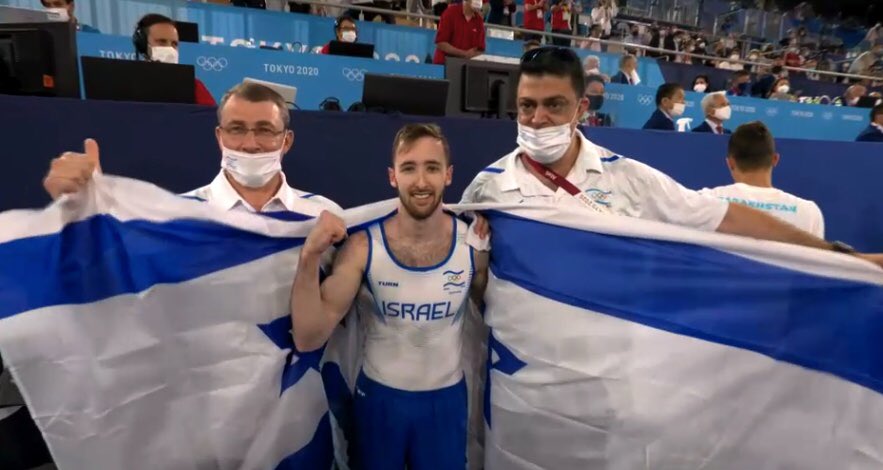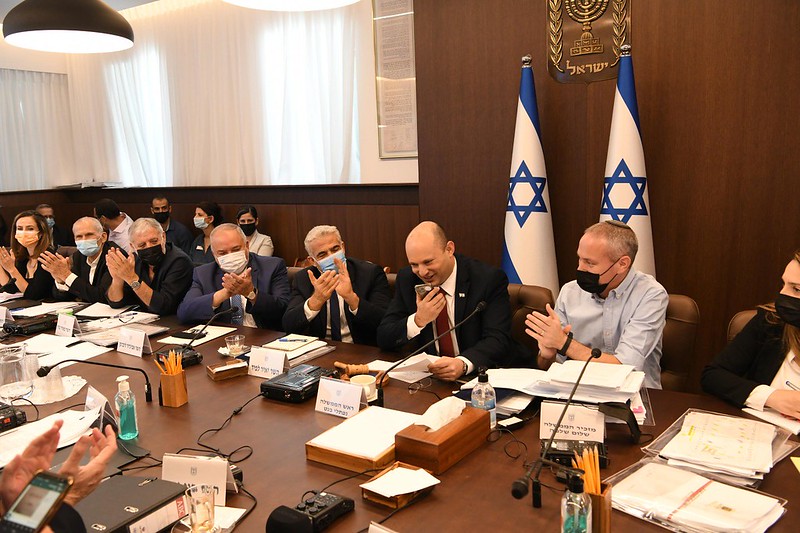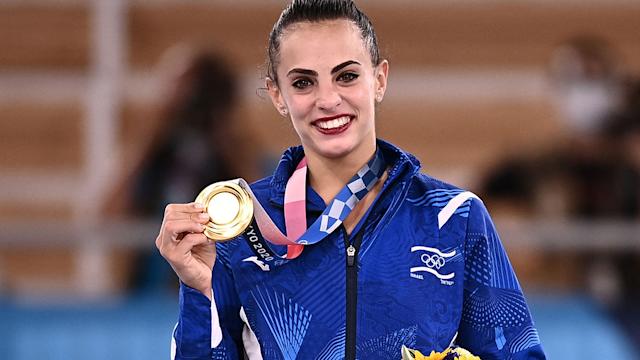Australia/Israel Review
Olympian Heights
Aug 24, 2021 | Amotz Asa-El

The Israeli cabinet was in the middle of its weekly session when Prime Minister Naftali Bennett, cellphone in hand, addressed Artem Dolgopyat, a previously anonymous citizen who had just become a national hero.
“Artem,” said Bennett, “you made history and brought us huge pride,” referring to the muscular, bearded and soft-spoken gymnast who had just won a gold medal in the floor exercises in artistic gymnastics at the Tokyo Olympics. The two dozen ministers seated around the cabinet table burst into applause.

An Olympic victory interrupted even the serious business of the Israeli cabinet (Source: Flickr)
So did the rest of Israel, whose athletes were at that point barely halfway through what would soon prove to be the most successful of Israel’s 18 Olympic Games appearances.
Historically, Israel’s relationship with the Olympics started off on the wrong foot. Israel’s two-member delegation to the 1948 London Games was barred from participating by British officials, who said the Israel Olympic Committee could not replace its predecessor the Palestine National Olympic Committee (which was itself created and dominated by Jewish groups), whose participation had been approved.
Fears that Britain’s real reason for this denial was Arab lobbying, and that such pressure would prevent Israeli participation in future games, were dispelled in the 1952 Games, where a 26-member delegation garnered applause marching behind the blue-and-white flag at a packed stadium in Helsinki.
Athletically, however, Israel won no medals, and thus launched a frustrating 40-year history of disappointment and defeat.
Politics, meanwhile, returned to cloud Israel’s Olympic appearances. The 1956 Melbourne games coincided with the second Arab-Israeli war, the Sinai Campaign, and Israel sent only a symbolic, three-person delegation, as most athletes had been drafted. Despite this delegation’s token nature, Egypt and two other Arab countries boycotted the games in protest at Israel’s participation.
The Middle East conflict’s presence at the games became traumatic and overwhelming in 1972, when 11 Israeli athletes and officials were slain by Palestinian terrorists.
In sporting terms, that ordeal coincided with, and derailed, Israel’s most promising athletic appearance until then. Sprinter Esther Roth-Shahanorov, rather than participating in the 100m hurdles in which she was a medal contender, ended up following her coach Amitzur Shapira’s coffin.
Efforts to hold some commemoration of the murder of the 11 Munich victims were made prior to all subsequent Olympics, before finally being properly acknowledged at the Tokyo games’ opening ceremony.
Yet overall, the conflict and its dramas were the exception at most Olympic games. The rule was that Israeli athletes competed, and lost. Some appearances were respectable, but none came close to winning medals.
The breakthrough came in the 1992 Barcelona games, when judokas Yael Arad and Oren Smadja won, respectively, silver and bronze medals. Israelis then went on to win an aggregate nine medals in judo, windsurfing, sailing and kayaking in six Olympics through to 2016 – topped by a lone gold medal to windsurfer Gal Friedman in the Athens games of 2004.
Yet none of those performances was nearly as successful as the Israeli delegation in Tokyo’s, which brought home two gold and two bronze medals. The sense of achievement for Israelis was amplified not only by the quantity and colour of the medals, but by the fields in which they were won.

Gymnast Linoy Ashram: Hailed for “stunning victory”
Dolgopyat’s field, the floor exercise in artistic gymnastics, is considered one of the most prestigious Olympic competitions, almost on par with the marathon and 100-metre dash. Nearly as well-known is the women’s all-round rhythmic gymnastics, in which Linoy Ashram won gold a week after Dolgopyat’s victory, becoming the first Israeli woman to win an Olympic gold medal.
The importance of Ashram’s victory was underscored by the Russian response to its representative’s defeat in a field that has been historically dominated by Russian women. The Russian Olympic Committee protested that gold-medal favourite Dina Averina was the victim of unfair refereeing – a claim dismissed by the international press as simply a bad case of being sore losers.
Meanwhile, the 22-year-old Ashram’s performance was hailed by the New York Times as a “stunning victory” which it counted among the games’ “seven moments worth revisiting.”
Israel’s other medals came in the martial arts, in which Israelis had excelled for decades, but here too there was further improvement. Firstly, previous success in judo now expanded to taekwondo, in which 19-year-old Avishag Semberg won a bronze. Secondly, Israel’s mixed judo team gained a bronze medal by defeating powerhouse Russia 4-1 – an inspiring effort involving eight male and three female judokas.
As with so many other things in Israel, success in the Tokyo games has had social and political dimensions that are larger than the protagonists and their dramas in the arena. The first of these is the role of immigrants in Israel’s recent sporting achievements.
Dolgopyat, who arrived in Israel at age 12 from Dnepropetrovsk, Ukraine, is but one of hundreds of immigrants from the former Soviet Union whose arrival in Israel has transformed Israeli sports over the past three decades.
Notable among these were pole vaulter Alex Averbuch, who won silver in the World Athletics Championships in 2001, high jumper Constantine Matusevich, who won fifth place in the Sydney games, rower Michael Kolganov, who won bronze in the Sydney games in 500m kayaking, and triple jumper Hanna Knyazyeva-Minenko, a three-time Olympic finalist, including sixth place in Tokyo.
Even more significantly, the Russian-speaking immigration brought trainers who introduced new techniques and attitudes that transformed Israel’s athletic education.
Odessa-born swimming coach Lyudmila Zlitchonok raised a generation of Israeli swimmers, including 18-year-old Anastasia Gorbenko who last year became European gold medalist in the 200m medley, and is herself the daughter of immigrants from Ukraine.
Similarly, Dolgopyat’s trainer, Alex Shatilov, arrived in Israel from Tashkent, Uzbekistan, and was himself a European champion and Olympic finalist. Meanwhile, women’s gymnastics in Israel have been revolutionised by Ira Vidorchik, who arrived from Moscow in 1979 and became controversial in Israel for the strict, Soviet-style discipline she imposed on her trainees.
What the Russian-speaking immigration did for Israeli gymnastics, track, and swimming, African immigration has done for long-distance running.
Led by Ethiopian-born trainers Yosef Gizachew, who arrived in Israel in 1991 at age 16, and Zohar Zimro, who arrived in 1987 at age 10, Israel fielded marathoners Marhu Teferi, Girmaw Amare, and Haimro Alame at Tokyo. All are Ethiopian-born graduates of Israeli high schools who also served in the IDF. Teferi finished 13th in Tokyo. With personal records under two hours and 10 minutes, the three are among the world’s top marathoners.
Israel’s long-distance running excellence born out of Africa is topped off by Kenyan-born marathoner Lonah Chemtai-Salpeter. In Tokyo, the 32-year-old was among the leading four for 37 kilometres, until abdominal cramps forced her to slip back and finish a heartbreaking 66th. However, the European 10,000-metre champion for 2018 remains the sixth-best female marathoner in the world, with a personal best time of 2:17:45.
Dolgopyat highlighted the role of immigrants in Israel’s new sporting success in a different and less positive way. As was reported both in Israel and internationally, he is in an administrative predicament as the child of a Jewish father and non-Jewish mother.
According to Israel’s Law of Return, Dolgopyat’s family was eligible for citizenship, but according to Israel’s marital laws, he can’t marry his non-Jewish girlfriend, a translator from Belarus, in Israel unless one of them converts to another religion. Israel has no civil marriages, and the ultra-Orthodox establishment which runs all Jewish marriages will only marry two people whose status as Jews is proven and unambiguous.
Asked about this by journalists, Dolgopyat refused to make a fuss, saying instead “this is a personal matter.” The humility of this response only made veteran Israelis adore their new darling even more, while also helping them appreciate the hardships immigrants must go through en route to the social acceptance any new citizen craves.
Having said all this, ten of the 12 Olympic medals Israelis have won individually since 1992 were taken by native Israelis.
Indeed, the immigrant contribution notwithstanding, the maturation of competitive sport in Israel is part of the Jewish state’s own maturation.
In terms of size, with 9.3 million inhabitants, Israel’s population is now larger than those of half the countries in the world, and five times what it was during the 1956 Melbourne games. In terms of investment, Israel’s new affluence has bred modern sports facilities, recreational parks, and professional training programs that took long decades to emerge.
Lastly, the military burden that once disturbed and disrupted the development of talented athletes has been eased. The IDF now offers promising talents special programs that allow athletic development and professional competition even while serving in the army.
Of course, Israel’s new ratio of one Olympic medal per 2.32 million citizens at Tokyo is still a far cry from Australia’s very impressive ratio of one medal per 0.56 million Aussies. Even so, it is vastly closer to that standard than it was back when the Melbourne games saw a three-person Israeli delegation make a purely symbolic effort to uphold the Olympic spirit amidst a Middle East war.
Tags: Israel






